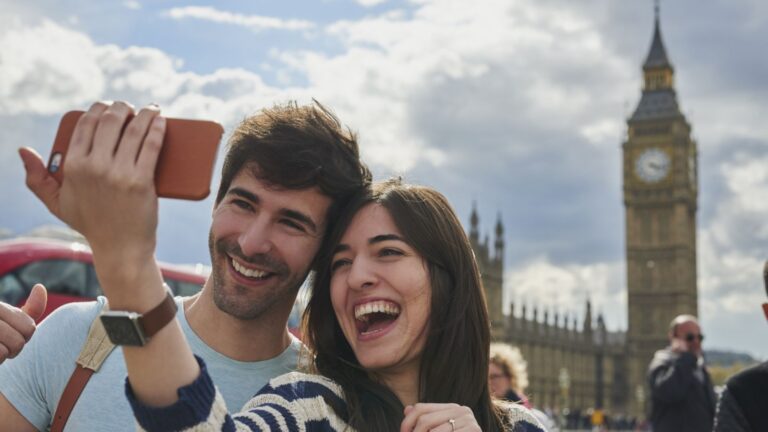While there are plenty of humorous tales about Brits in Europe, your holiday shouldn’t become one of those clichés. Being aware of the local culture and rules can help you stay safe and avoid trouble, while immersing yourself in authentic experiences can make your trip truly memorable. Here are 19 things to avoid if you want to fully enjoy your time in Europe.
Wearing Only Your Swimsuit in Public Places

Even if you weren’t planning on walking the streets of Paris in your two-piece, it is good to know how much trouble you can get into if the mood strikes. In several European countries, wearing only swimming shorts or a bikini on a public street is illegal. As Etias reports, in Mallorca (Britain’s favorite holiday destination), the ban even includes the beachfront promenade.
Not Being Open to Local Culture

You aren’t in Birmingham anymore, tourist. Not being open to trying local foods and appreciating local customs keeps you from fully experiencing a new place. You don’t want to be that person looking for a full English in Barcelona or only eating McDonald’s and Starbucks everywhere you go.
Drinking in Public

Public consumption of alcohol is legal in some countries, like Germany, but it’s illegal in others, such as Poland, where you could be fined. So while you may have dreams of walking down the streets with a nice adult beverage, it is important to make sure you know the local laws first.
Taking Selfies with Selfie Sticks

According to The Local, Milan has banned selfie sticks to crack down on “anti-social behavior.” It may not be illegal in every place you travel, but it may be considered rude or tacky. Be mindful of what you see the locals doing and try to follow their lead.
Littering

It should really go without saying that you shouldn’t litter anywhere. However, littering in Europe can result in fines, especially since there’s a ban on using plastic bottles and cutleries in many European countries. Also, notice that some European countries have different rules and places for recycling, and in some countries, you can even get money back for recycling certain items.
Wearing Heels at Historic Sites

Not only can heels be impractical when you’re running around Europe trying to take it all in in a short time, but in some places, they’re considered disrespectful or are even not allowed at all. Heels were banned from historic monuments in Greece because they have the potential to scratch the surface of these monuments.
Expecting Waiters to Drop the Bill

Brits are used to servers popping by their table multiple times during the meal and dropping the bill with a “no rush” that always feels like a nudge out the door. It’s considered rude in many European cultures to rush people through their dining experience. You will need to ask for the check or politely get the server’s attention if you need something.
Assuming That Everyone Knows English

It’s easy to assume everyone in Europe speaks English because so many do; however, it is rude to expect people in their own country to speak your native tongue. When traveling, make your best attempts to use the language of the land or travel with someone who does. Translate apps aren’t perfect but they can generally get an idea across.
Leaving a Bigger Tip Than Required

Brits love to brag about being big tippers, but the culture around tipping varies from country to country. Servers are paid a living wage in European nations, and tips are considered a small bonus to reward great service or round the total bill to a convenient number.
Jaywalking

Jaywalking is a way of life in most of the UK, although we don’t tend to use the word itself – that’s more of an Americanism. Either way, in countries like Germany, it’s a social rule to wait for the green light at pedestrian crossings, and locals will reprimand you for breaking this rule even in the middle of the night.
Taxis Late At Night

If you’re looking for a licensed taxi stand, they’re usually marked with a “T.” Making sure to be in a reputable taxi can help save you from extra fees and scams. “Ignore drivers that approach you off the street and make sure [their] driver’s license is clearly visible in the cab,” advises Get Tours. If you are traveling at night, it may be easier and safer to use Uber or another local app.
Peeing in the Ocean

In Portugal, there is a law that allows the police to write tickets if you pee in the ocean. However, the legislation does not state how they will know if that part of your body is submerged in water.
Only Visiting Major Tourist Attractions

Of course, you’ll be drawn to certain places for their well-known sites, and it is perfectly acceptable to check those off your bucket list. Just be sure to leave space in your itinerary to wander the streets and see whatever just happens to come across your path.
Assuming Bathrooms are Free

Public toilets in the UK are generally free or designed for patrons of the establishment. In Europe, many public places, such as shops, train stations, and even fast food restaurants, charge a small fee for their use. These will either be paid to a turnstile or a live bathroom attendant. It may be a little off-putting until you notice how clean the toilets always are.
Not Trusting Local People

You can miss out by not engaging with locals. If you have the ability to speak with people around you, locals can point out places that will give you an actual feel for what it’s like to live there instead of places catering to tourists.
Avoiding Public Transportation

In Europe, people tend to use public transportation far more often because it’s cheap and efficient, not to mention better for the environment. So, as a Brit, don’t be afraid to hop on a train to get from one city, or even country, to the next.
Being Too Loud

It’s the stereotypical depiction of Brits as loud, obnoxious, and being sunburnt everywhere they go. If you don’t want to stand out and also want to be respectful of your surroundings, be sure to stay within the volume level of the people around you.
Sticking with the Planned Itinerary Only

Scheduling out every minute of your trip can seem like the best way to optimize your trip, especially for Type A people. However, overscheduling leaves no room to follow exciting things you may run into or hear about from the locals. Come with an idea of what you want to do but leave room to go with the flow.
Eating Near Tourist Attractions

These places are often overpriced, knowing tourists don’t know what to expect and will stop there for convenience. Explore local eateries for a more authentic and cost-effective dining experience. Key tip—if more people are speaking languages other than the native language, it is probably a tourist trap.

